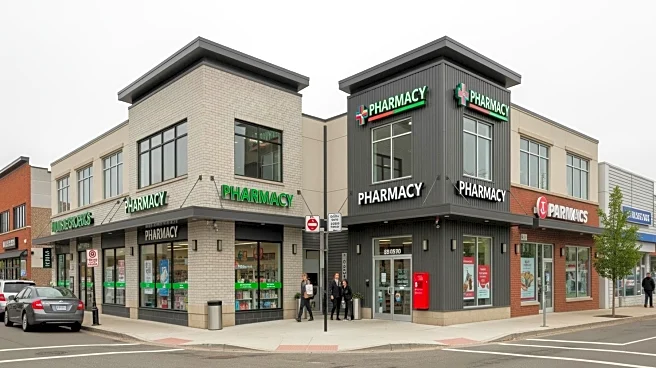What's Happening?
CVS Health is set to open nearly 100 community-focused pharmacies this year, including over 60 locations acquired from the bankrupt Rite Aid in the Pacific Northwest. This expansion is part of CVS's strategy to enhance face-to-face pharmacy care, which
is highly valued by consumers according to a recent survey. The company is also introducing more small-format stores, each less than 5,000 square feet, to better serve local communities. CVS had previously announced plans to close 271 stores to achieve $2 billion in savings, but the acquisition of Rite Aid assets has shifted its focus towards expanding its brick-and-mortar presence. CVS now operates 63 former Rite Aid and Bartell Drugs stores in Idaho, Oregon, and Washington, and has acquired prescription files from 626 former Rite Aid and Bartell Drugs pharmacies across 15 states.
Why It's Important?
The expansion of CVS's community pharmacy network is significant as it addresses the growing demand for in-person pharmacy services, which 80% of patients prefer over digital-only options. This move not only strengthens CVS's retail footprint but also enhances access to healthcare services in local communities. By acquiring Rite Aid locations, CVS is able to maintain and expand convenient and trusted pharmacy care across the U.S., potentially increasing its market share in the pharmacy sector. The strategic shift from store closures to expansion reflects CVS's commitment to adapting to consumer preferences and public health needs, which could lead to increased customer loyalty and revenue growth.
What's Next?
CVS is likely to continue its focus on expanding its community pharmacy network, potentially acquiring more locations to further increase its presence in underserved areas. The company may also explore additional partnerships or acquisitions to enhance its service offerings and improve patient care. As CVS integrates the acquired Rite Aid locations, it will need to ensure seamless transitions for customers and staff, which could involve logistical challenges. Stakeholders, including local communities and healthcare providers, may respond positively to the increased access to pharmacy services, while competitors may need to adjust their strategies to maintain market position.
Beyond the Headlines
The expansion of CVS's community pharmacies could have broader implications for the healthcare industry, particularly in terms of public health access. By reimagining the role of pharmacy teams, CVS is positioning itself as a key player in local healthcare delivery, which could influence how other pharmacy chains approach community engagement and service provision. Additionally, the shift towards smaller-format stores may reflect a trend in retail towards more personalized and accessible shopping experiences, which could impact the future design and operation of pharmacy locations.















